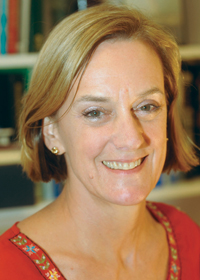UCSF's Cooke Wins Prize for Article on Cost Consciousness in Medical Education
Medical schools should be teaching future doctors the value of a health care dollar, according to Molly Cooke, MD, FACP, professor of medicine and director of the Haile T. Debas Academy of Medical Educators at UCSF.

Molly Cooke, MD, FACP
With the rising and unsustainable cost of health care in the United States, Cooke said, change could be effected on one of the most basic levels: between that of a physician and patient. In an article appearing in the April 8, 2010 issue of the New England Journal of Medicine, Cooke made the case that cost consciousness should be a skill taught to medical professionals like any other they receive in training.
Cooke’s article was recognized in July as one of the Best Articles in Medical Professionalism by the American Board of Internal Medicine (ABIM) Foundation for highlighting the primacy of patient welfare, patient autonomy and social justice. Read the entire paper online here.
“I would argue that patients depend on us to help them understand both the likelihood that they will experience benefit and the cost, broadly construed, at which that benefit might be won,” she wrote in the article. “We must educate medical students and residents in settings where they have opportunities to develop and use cost-conscious strategies in caring for patients.”
More than 100 articles were reviewed for ABIM's Professionalism Article Prize and organized into three categories: Commentary/Perspective, Medical Education and Training, and Professionalism in Practice. A selection committee, made up of physicians, patients and authorities on medical practice and education, reviewed the articles and judged them based on clarity of writing, thoroughness, methodology, and contributions to the field and society.
National Leader in Medical Education
Cooke, who is widely recognized as a national innovator in medical education, envisions innovative curricula that instructs future medical professionals in real-life settings such as outpatient clinics, where students can also test the effectiveness of different strategies. She admitted such integration would face its challenges, ranging from possible conflicts of interest that arise from incentive programs and allaying health providers’ fears of denying services based on cost.
In 2010, Cooke, David Irby, PhD, PhD, former vice dean for Education in the UCSF School of Medicine and Assistant Professor Bridget O’Brien, PhD – published the results of their five-year study of medical education in the United States. They share their lessons learned and recommendations for the future in Educating Physicians: A Call for Reform of Medical School and Residency, which calls for a new vision in medical education to attain the next level of excellence. The report is published by the Carnegie Foundation for the Advancement of Teaching.
“There is a need to motivate continuous learning and improvement across the whole arc of medical training,” the authors wrote.
Many of the team’s findings already have been implemented at UCSF, including the creation of a state-of-the-art Teaching and Learning Center on the Parnassus Heights campus. The 20,000-square-foot center, opened in January 2011, uses the latest technology in medicine to create a setting in which dental, medical, nursing and pharmacy students can train as a team to provide patient care.
Cooke is the founding director of the Haile T. Debas Academy of Medical Educators, which serves as a community for medical school faculty with significant commitment to medical education, to advocate for teachers in the promotion process and to enhance funding in support of teaching. She holds an MD degree from Stanford University.